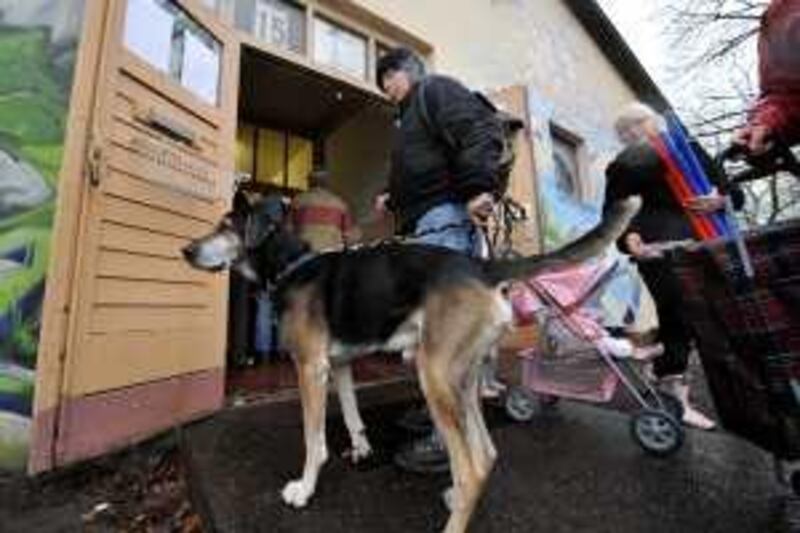BERLIN // Tens of thousands of impoverished pet owners have been bidding a distraught farewell to their Alsatians and Dachshunds at animal shelters across Germany this year in a poignant illustration of how the worst economic downturn since the 1930s is biting this nation of dog lovers. The German Animal Welfare Association has warned that 70,000 more animals than usual have been abandoned this year, and that in 69 per cent of cases, owners are citing "financial emergency" as the reason. "We're facing a twin burden because of the financial crisis - more people are handing in their pets and donations have gone down," said Marius Tünte, a spokesman for the association. "Our shelters are full to bursting, there's no money to invest in enlarging them, and we don't have enough staff to take care of the animals." Dogs, of which there are 5.5 million in Germany, make up 85 per cent of the pets handed in to shelters. But cats are also being dumped, along with a variety of other species that are costly to handle, including so-called exotic pets such as Iguanas and Tarantula spiders. Even horses have been abandoned, in most cases in emaciated condition, because the owners could not afford to feed them properly and waited until the last minute before giving them up. "With dogs and cats, it's often the older ones and the sick animals that are let go because they cost most to look after," said Mr Tünte. Not all animals are handed in to homes. Many are just left tied to roadside posts with signs such as "My owner is on welfare and can't afford me" around their necks. "Most people give up their pets as the very last resort because animals can be a great support in times of loneliness or crisis," said Mr Tünte. "If you're old or you've lost your job, your dog can be a bridge to the outside world. And he'll always run up to you with his tail wagging, no matter how you're dressed or how little money you've got." While Germany is no longer technically in recession, it remains on course to suffer its biggest downturn in more than 70 years this year, and unemployment is expected to rise sharply over the winter as government job protection schemes run out. "We expect a really tough autumn," said Mr Tünte. Three quarters of animal homes have had to shelve urgently needed investments because they lack the funding, and some homes are on the verge of bankruptcy, the animal association warned this summer. Berlin's animal home, the biggest in Europe supported by 15,000 members, has run out of room and says donations are down 10 per cent this year. "We're very worried about our dogs, we've got space for 180 but are having to look after 270," said Marcel Gäding, a management member. Putting animals down is not an option, he insisted. "We're an animal protection society, not an animal killing society." A dog costs an estimated ?900 to ?1,200 (Dh4,860-6,480) per year in tax, food and vet bills. "If you lose your job, it's often impossible to go on affording that," said Mr Gäding. "Many people who come to us have spent their last euro looking after their pet. It's a disaster when they have to say goodbye to their four-legged partner. We've had cases where owners hand over their pets with a box of their toys and just burst into tears." Animal shelters have been trying to prevent such heart-break by donating pet food, but resources are stretched to the limit. Tiertafel or Animal Table, a charity that hands out free food, dog leads and bowls, has seen demand surge in recent months. The president of the animal welfare association, Wolfgang Apel, called on the government to provide a ?15 million cash injection for the 519 animal shelters, which are financed exclusively from private donations and members' fees. Mr Apel also wants the government to provide the long-term unemployed with benefits to look after their pets. "Protecting animals is up to the whole of society," Mr Apel said in a statement. "If we don't act now we'll have to unload the animals in front of town halls, because we've been looking after them on behalf of the community. This is becoming increasingly dramatic by the day." dcrossland@thenational.ae
Germany's abandoned dog crisis
The worst economic downturn since the 1930s is biting this nation of dog lovers, with tens of thousands being abandoned.

Editor's picks
More from the national





